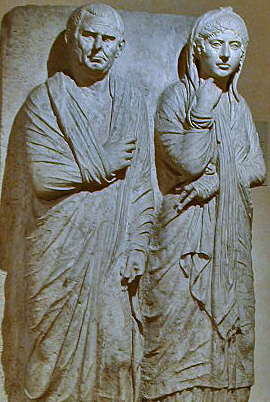 Funerary Relief of Married couple
Funerary Relief of Married coupleRome, mid-1st century BCE
 Funerary Relief of Married couple
Funerary Relief of Married coupleWhile Roman marriage was intended to be a lifelong bond — and for most couples probably was — both parties had the capacity to divorce during the classical period. While divorce could be consensual or unilateral in the Republic and Principate (see Treggiari, Roman Marriage, Appendices 5-6), surviving evidence tends to present the husband's perspective. Plutarch claims that in Rome's earliest days Romulus gave the husband alone the right to disolve his marriage for various offences committed by his spouse (poisoning, substituting children, adultery: Romulus 22.3). The husband put aside (repudiare) his wife by saying tuas res tibi habeto or tuas res tibi agito (Digesta 24.2.2.1; Cicero attributes these words to the 450 BCE laws of the Twelve Tables in Philippics 2.28.69), reclaiming his house keys, and sending her away. For the wife, the financial and social consequences of being divorced (repudium) were serious: she assumed the social status of a vidua, a woman without a husband, and left behind her marital home, her children, who belonged to her husband's family, and the gifts she had been given by her husband, returning to the house of her paterfamilias, who would seek the return of her dowry if she was innocent of wrongdoing. In the first recorded instance of divorce in 307/6 BCE, cited by Valerius Maximus (Facta et Dicta 2.9.2), Lucius Annius divorced his wife without first consulting his friends and so was removed from the Senate by the censors, revealing societal unease with no fault divorce. The passages below focus on the first reported incident of a woman being divorced for childlessness; in 230 BCE, Spurius Carvilius Ruga justified divorcing his unnamed wife on the grounds that the object of lawful Roman marriage was the propagation of Roman citizens (see Purpose in Matrimonium); despite his legally valid explanation, in the passage below Valerius Maximus notes that Carvilius's contemporaries did not approve. Husbands later divorced their wives for a variety of reasons beyond their failure to produce children (sterilitas), a deficiency that was always attributed to the wife. A number of late Republican political leaders dissolved their marriages for adultery, a crime of which no woman could accuse a man, financial pressure, political or social advantage, or simply losing the intention to be married (affectio maritalis: see Digesta 24.1.32.13). Sulla divorced Cloelia for infertility to marry the wealthy Caecilia Metella; Pompey divorced Antista to marry Sulla's stepdaughter Aemilia and later divorced Mucia for adultery; Julius Caesar divorced Pompeia for not being "above suspicion"; Cicero and Terentia divorced for incompatibility; Mark Antony divorced Antonia to marry Fulvia and later divorced Octavia to marry Cleopatra; Octavian divorced Clodia Pulchra out of hostility to her mother Fulvia and later Scribonia to marry Livia, who, though pregnant with his second son, divorced her husband Tiberius Claudius Nero to marry Octavian. Like marriage, divorce was a private arrangement between families, and did not involve the state until Augustus passed laws concerning marriage and adultery in 18 BCE. Despite the promotion of the qualities of marital loyalty (fides), harmony (concordia) and conjugal affection (affectio maritalis) by the imperial court, from the time of the late Republic Roman citizen women could and, particularly among the upper classes, did choose to leave their marriage (divertere) for reasons not recorded but no doubt similar to those of their husbands. See Treggiari (Roman Marriage, Ch. 13) for further information on divorce; see Lefkowitz and Fant for other instances of divorce in Early Rome; for an overview of the topic see Smith, Divortium; see Laudatio Turiae (Worlds of Roman Women, pp. 43-45) for a husband who did not divorce his wife for not bearing him children.
Repudium inter uxorem et virum a condita urbe usque ad centesimum et quinquagesimum
![]() annum nullum intercessit. primus autem Sp[urius] Carvilius uxorem sterilitatis causa dimisit. qui, quamquam tolerabili ratione motus videbatur, reprehensione tamen non caruit, quia ne cupiditatem quidem liberorum coniugali fidei praeponi debuisse arbitrabantur. Sed quo matronale decus verecundiae munimento tutius esset, in ius vocanti matronam corpus eius adtingere non permiserunt, ut inviolata manus alienae tactu
annum nullum intercessit. primus autem Sp[urius] Carvilius uxorem sterilitatis causa dimisit. qui, quamquam tolerabili ratione motus videbatur, reprehensione tamen non caruit, quia ne cupiditatem quidem liberorum coniugali fidei praeponi debuisse arbitrabantur. Sed quo matronale decus verecundiae munimento tutius esset, in ius vocanti matronam corpus eius adtingere non permiserunt, ut inviolata manus alienae tactu
![]() stola relinqueretur.
stola relinqueretur.
(1) Memoriae traditum est quingentis fere annis post Romam conditam nullas rei uxoriae neque actiones neque cautiones in urbe Roma aut in Latio fuisse, quoniam profecto nihil desiderabantur nullis etiamtunc matrimoniis divertentibus.
(2) Servius quoque Sulpicius in libro quem composuit de dotibus tum primum cautiones
![]() rei uxoriae necessarias esse visas scripsit, cum Spurius Carvilius, cui Ruga cognomentum fuit, vir nobilis, divortium cum uxore fecit, quia liberi ex ea corporis vitio non gignerentur, anno urbis conditae quingentesimo vicesimo tertio, M[arco] Atilio [et]
rei uxoriae necessarias esse visas scripsit, cum Spurius Carvilius, cui Ruga cognomentum fuit, vir nobilis, divortium cum uxore fecit, quia liberi ex ea corporis vitio non gignerentur, anno urbis conditae quingentesimo vicesimo tertio, M[arco] Atilio [et]
![]() P[ublio] Valerio consulibus. Atque is Carvilius traditur uxorem, quam dimisit, egregie dilexisse carissimamque morum eius gratia habuisse, set iurisiurandi religionem animo atque amori
P[ublio] Valerio consulibus. Atque is Carvilius traditur uxorem, quam dimisit, egregie dilexisse carissimamque morum eius gratia habuisse, set iurisiurandi religionem animo atque amori
![]() praevertisse, quod iurare a censoribus coactus erat uxorem se liberum quaerundum gratia habiturum.
praevertisse, quod iurare a censoribus coactus erat uxorem se liberum quaerundum gratia habiturum.
Click on the underlined words for translation aids and commentary, which will appear in a small window. Click on the icon link![]() to the right of the line for related images and information.
to the right of the line for related images and information.